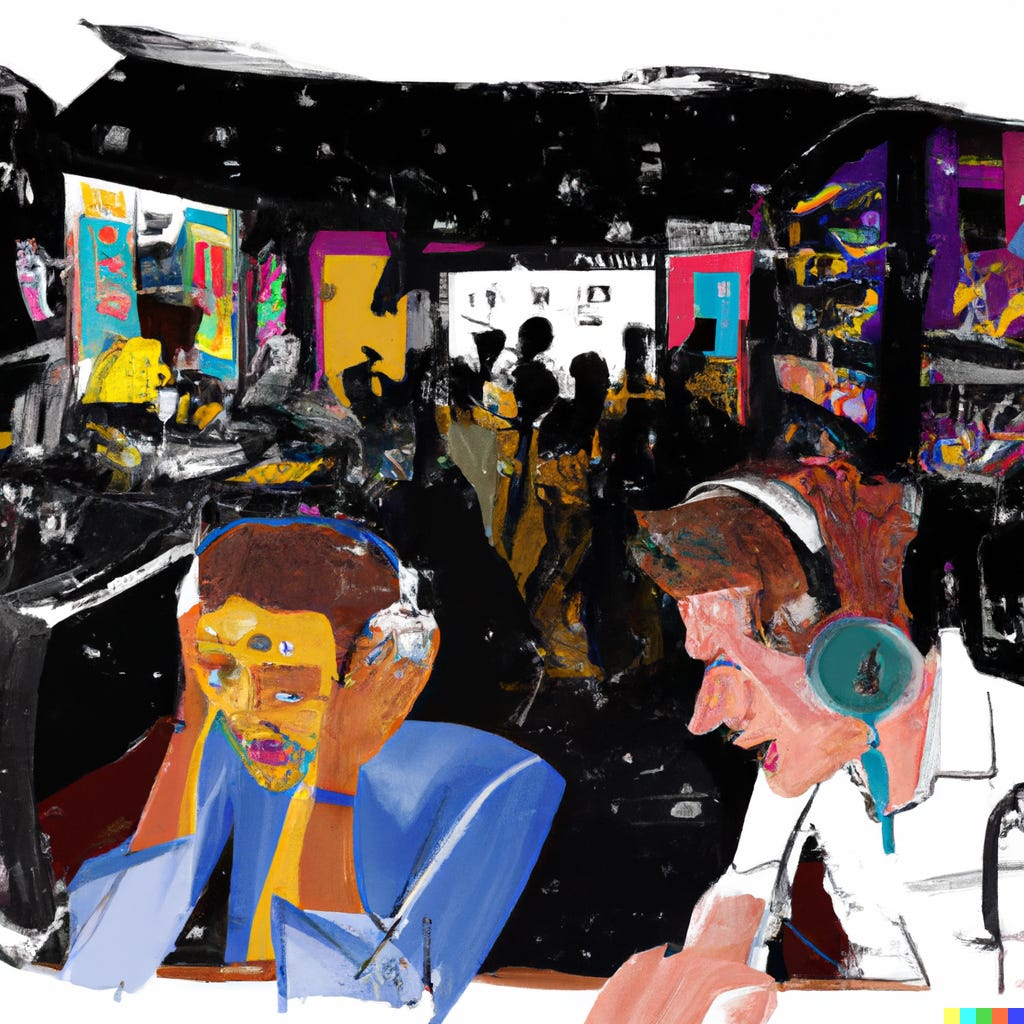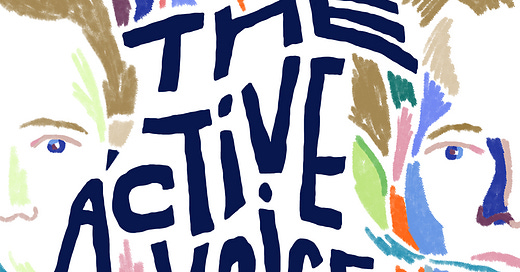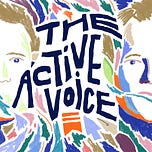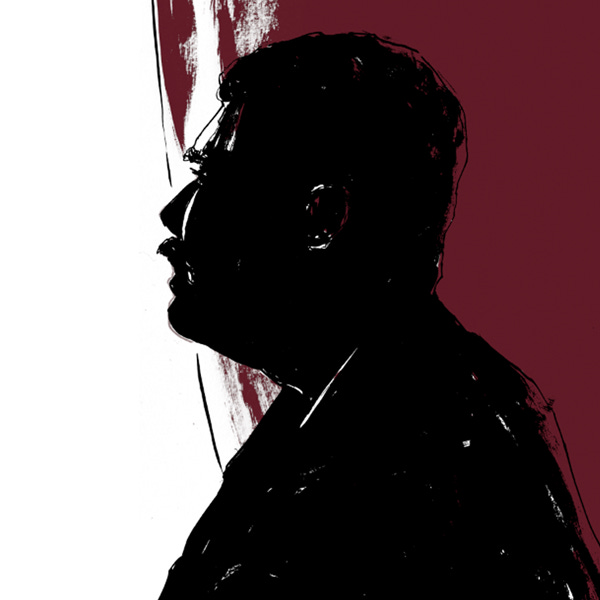At first glance,
and might not seem to have much in common. Mike, the publisher of the newsletter , is very much a child of the internet, a strong proponent of the tech industry and scientific progress, with a career in venture capital (working in marketing) after a brief stint in book publishing. Ted, who writes and has been a guest on The Active Voice before, is one of America’s greatest music critics, founder of the Jazz Studies program at Stanford University, and the author of 12 books. What they share is a deep love for words and their significance in shaping culture. And even though they will both deliver us the bad news about the latter’s collapse, there is an underlying optimism in their insistence on protecting it, from their own little corner.This week we brought them together at Substack’s headquarters in San Francisco for a conversation on The Active Voice about maintaining our optimism at a time of neck-breaking technological change. What followed was a wonderful and wide-ranging jam session on everything from the disappearance of counterculture to the significance of trustworthy voices in the age of AI to the ongoing collapse of the media industry and the rise of something new from its ashes. I’m sure you’ll enjoy it!
We have another of these writer dialogues planned for a later episode and may do more of them depending on your feedback—so please let us know what you think in the comments.
Quotes from the conversation
Mike on humanity being amazing
I always come back to the idea that humanity, people, all of us—I mean, the goal is elevation and progress and being better, to be improved, to make things better than they currently are; not even better: great.
Mike on the changing media landscape
When you’re on advertising dollars, you’re competing with everybody else on advertising dollars on these same platforms where the algorithm drives you to the same things that become popular. That’s how you get the advertising revenue, is by flattening out your identity. And that’s what happened to all the new media companies, except the people on subs[criptions].
Ted on Upworthy and clickbait
Just everybody was clicking on these things, and after a while people are saying, “I’m not that stupid, I’m sorry.” And this thing just took off, and then it still exists but it’s laid off and it never realized its potential. But for a point in time, it was the fastest-growing media strategy and we were all supposed to imitate it.
Ted on the information age
All these technologies made things more trustworthy. But that has shifted in the last 5, 10 years, in that the most prevalent technologies make things less trustworthy. The most obvious example right now is AI. [...] The model is based on training the AI on people that just spread disinformation. So I look at a world in which there’s no shortage of information, but the real shortage is trust.
Ted on being an honest broker
I could give you so many examples of things happening on these large platforms that seem duplicitous and designed to hurt musicians and creators in our economy, and no one will even tell you a straight story on this.
Mike on AI
Do humans, because of this, in the age of artificial intelligence, become more unpredictable and chaotic? How crazy would that be? The thing that it’s like a slight edge now becomes the only thing left. And so actually we become, I don’t want to say more irrational, but it’s going to be we’re going to look a lot more wild, maybe. Our writing will be more wild. Our music will be more wild. You have to be different.
Mike on the future of writing
What I don’t want is to live in a world where everybody else can walk around and just steal my voice. That’s like the Little Mermaid. It’s horrifying. It’s Ursula status. I don’t want that. I want my own voice and I want to be able to use it to hire a thousand robot clones of me so I can put them on every single thing I want to cover, because there’s a lot and I don’t get to it.
Mike on adaptability
To tell a story in a different medium, you have to tell it in a completely different way. I think the parallel there is, to exist culturally in the world, you have to exist in a fundamentally different way.
Mike on content
The word “content” is cover for people who are not really producing much value but are getting a lot of attention. And it’s like it legitimizes everyone doing dumb shit online.
Ted’s reply
If you’re involved in my world, the music world, and you’re dealing with a business or a web platform or an agent or whatever, if they use the word “content,” that’s a signal they don’t know a damn thing they’re talking about, because those businesses are based on creativity, inspiration, vision, artistry, and none of those things are covered by the word “content.”
Ted on counterculture
We’re in a world in which there’s not a whole lot of difference between the various voices out there and the legacy culture. They all seem to be saying the same thing. [...] The counterculture—I think this is how I would define it—is somebody that’s on the fringe today, but believes that the fringe that we represent can either go mainstream or transform the mainstream in some meaningful way.
Ted on publishing
Over time, it became harder to work with the small ones, because the industry became more monolithic. I was what was known as a midlist writer for a long time, which meant I wasn’t going to have a bestseller. On the other hand, I wasn’t just going to sell a few hundred copies.
Mike on books
It seems like people are reading less longer-form; they’re living online more. And even online, I feel that we . . . I think there’s a lot of short-form video stuff happening. That’s where most people are living.
Ted on writing on Substack
I think the attitude we have, in that we’re outside the system, we’re critical of the system, we want to have an impact in changing the system—but those people, our voices sometimes are threatening to them. To me, that’s the closest thing to a counterculture we have right now. And we need more of it.
Show notes
Subscribe to Pirate Wires by Mike Solana, and The Honest Broker by Ted Gioia, on Substack
Find Mike on Twitter, and Pirate Wires on Twitter and Instagram
Find Ted on Twitter, Instagram, and his website
Read Mike’s pinned tweet
[5:55] The changing media landscape
[12:10] Spotify’s algorithm
[16:32] Grimes and AI
[22:10] AI and writing
[25:10] What is “content”
[35:30] The counterculture
[45:00] Traditional publishing
The Active Voice is a podcast hosted by Hamish McKenzie, featuring weekly conversations with writers about how the internet is affecting the way they live and write. This episode was produced by Sophia Efthimiatou and Hamish McKenzie, with audio engineering by Seven Morris, and content production by Hannah Ray. All artwork is by Joro Chen, and music is by Phelps & Munro.
Postscript

Editor’s note: This post was edited at 08:46 ET to update the introduction of the guests. Some paragraphing and structural changes were made.





















Share this post